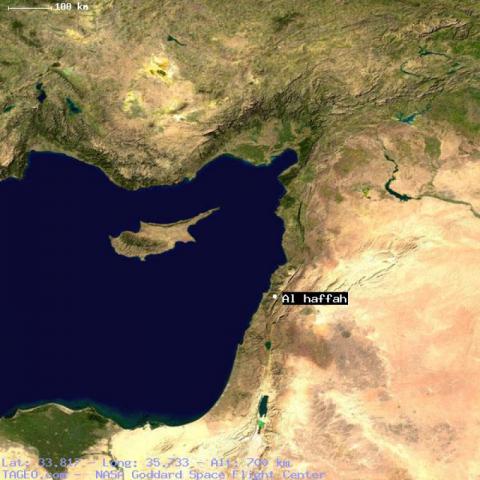
On 6 October 2015, Alkarama and Human Rights Guardians sent a communication to the United Nations Working Group on Enforced or Involuntary Disappearances (WGEID) regarding the case of 23-year-old Mahmoud Ali Deeb and 32-year-old Mohannad Al Kheir, who disappeared in the town of Al-Haffah in the Latakia Governorate between 2012 and 2013.
Mahmoud Ali Deeb's disappearance
On 20 June 2012, members of the Syrian Army and the Air Force Intelligence, dressed in military and civilian clothes, raided former army member Mahmoud Ali Deeb's house in the town of Al-Haffah – located 33 kilometers east of the city of Latakia − and arrested him, his father and two of his brothers. Although his family members were released shortly after their abduction, Mahmoud remained under the custody of the military. He was first sent to the Air Force Branch of Latakia, then transferred to the Al-Balona Prison in Homs, where he stayed for six months, following which he was transferred to Branch 291 of the Military Intelligence in Damascus, the main intelligence body in Syria, known for being a place where torture is systematically practiced.
Since Mahmoud's last transfer, the authorities have kept on refusing to provide his family with information on his fate and whereabouts. Even the two lawyers appointed to deal with his case were not able to obtain any information. His family is deeply concerned over his physical integrity, as it is highly likely that Mahmoud was arrested for having defected from the army obligatory service and, therefore, may be the victim of reprisals, as are many other defecting soldiers, such as former pilot Nasrallah Al Moazzin, who disappeared following his abduction by the Air Force Intelligence in 2013.
Mohannad Al Kheir's disappearance
On 13 February 2013, Mohannad Al Kheir was participating to a protest in Al-Haffah when a sniper of the Syrian Military forces shot him. Wounded, he was arrested and taken to a military hospital in Latakia, where he went through a surgery, after which he was transferred to an unknown location. Following his disappearance, Mohannad's house was burned by forces belonging to the regime. Fearing further reprisals, his family did not take any action at the national level.
Steps taken to locate them
In view of these facts, Alkarama and Human Rights Guardians seized the WGEID, requesting it to ask the Syrian authorities to release the victims immediately or, at the very least, to put them under the protection of the law by disclosing their whereabouts and allowing their families to visit them without restriction.
"The practice of enforced disappearance in Syria is constantly on the rise," says Inès Osman, Legal Officer for the Mashreq at Alkarama. "Most disappearances are carried out by the army during mass arrests; however, the practice is also used by different security branches as a tool of repression against protesters, such as Mohannad Al Kheir, or men who refuse to serve in the army, such as Mahmoud Ali Deeb," she adds.
In view of the systematic violations of human rights committed in Syria, Alkarama urges the State authorities to take action to:
• Put an end to the systematic and widespread practice of the crime of enforced disappearance;
• Combat impunity for perpetrators of human rights violations;
• Ratify the International Convention for the Protection of All Persons from Enforced Disappearance (CED).
For more information or an interview, please contact the media team at media@alkarama.org (Dir: +41 22 734 1008)
